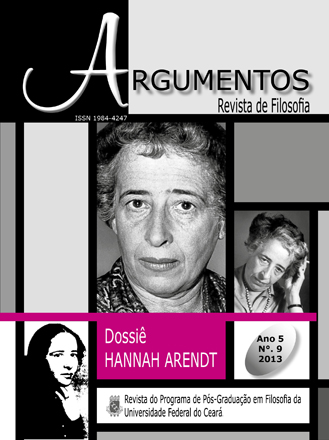Pluralidade de vozes: a garantia da dignidade humana
Palavras-chave:
Condição humana. Hannah Arendt. Dignidade Humana. Amizade.Resumo
O objetivo da presente investigação consiste em compreender quais aspectos da condição humana são fundamentais para garantir dignidade ao ser humano. Tais reflexões serão balizadas teoricamente pela obra da filósofa contemporânea Hannah Arendt. Inicialmente discutir-se-á a dignidade humana a partir de um viés negativo, isso é, de sua ausência. Para tanto, apresentar-se-á a espontaneidade humana e o aniquilamento da mesma em governos autoritários, que impedem a existência dos espaços de aparecimento humano, isso é, de espaços autenticamente públicos em que a ação e o discurso se apresentam. A seguir, analisar-se-á a usurpação dos direitos humanos de uma parcela da população expulsa da condição de pertença a uma comunidade política. Alerta-se que a discussão acerca dos governos autoritários tem caráter de exemplo, não se pretende aprofundar ou reconstruir historicamente os mesmos. Assim, a partir da reflexão acerca da ausência de dignidade, analisar-se-ão alguns elementos que se mostram peculiares à garantia da dignidade dos homens e mulheres que compõem a comunidade humana, a saber: a singularização, ou seja, a individuação alcançada pelo discurso no espaço humano de aparecimento, espaço em que se privilegia a pluralidade de opiniões e a ação; e, a amizade cultivada pelo diálogo e garantidora da qualidade do que é humano.
Downloads
Publicado
Edição
Seção
Licença
Autores que publicam nesta revista concordam com os seguintes termos (SOBRE COPYRIGHT E POLÍTICA DE ACESSO LIVRE):
1. Autores mantém OS DIREITOS AUTORAIS concedidos à revista OU Direito de Primeira Publicação, com o trabalho simultaneamente licenciado à Atribuição de Licença Creative Commons (CC BY) que permite o compartilhamento dos trabalhos com reconhecimento de autoria e publicação inicial nesta revista.
2. Autores têm permissão para aceitar contratos, distribuição não-exclusiva da versão do trabalho publicada nesta revista (por exemplo: publicar no repositório institucional ou como um capítulo do livro), com reconhecimento de autoria e publicação inicial nesta revista.
3. Autores têm permissão e são estimulados a publicar e distribuir seu trabalho on-line (por exemplo: em repositórios institucionais ou em sua página pessoal) mesmo durante o processo editorial, haja visto que isso pode aumentar o impacto e citação do trabalho publicado.




.jpg)










._._3.png)
1.jpg)
._._._.png)
